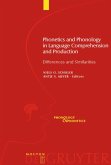This book provides an overview of current issues in variation and gradience in phonetics, phonology and sociolinguistics. It contributes to the growing interest in gradience and variation in theoretical phonology by combing research on the factors underlying variability and systematic quantitative results with theoretical phonological considerations. Variation is inherent to language, and one of the aims of phonological theory is to describe and explain the mechanisms underlying variation at every level of phonological representation. Variation below the segment concerns articulatory, acoustic and perceptual cues that contribute to the formation of natural classes of sounds. At the segmental level there are grammatical differences in the production and perception of contextual variation of segments and in the syntagmatic constraints on the combination of segments. At the suprasegmental level the mapping of tones to grammatical functions and vice versa is discussed. Further aspects addressed in this book are factors outside of language: Variation that arises as a result of a particular dialect or of belonging to a certain age group, or variation that is the consequence of language change.
Gradience and variation have always been a central issue in phonetic and sociolinguistic research. Gradience introduces variation in phonology as well. If a phonetic entity can be pronounced in different ways, depending on the environment, prosodic factors or dialectal influences, this â??gradienceâ?? may introduce â??variationâ??, which we understand as a stable state of grammar.
Gradience and variation have always been a central issue in phonetic and sociolinguistic research. Gradience introduces variation in phonology as well. If a phonetic entity can be pronounced in different ways, depending on the environment, prosodic factors or dialectal influences, this â??gradienceâ?? may introduce â??variationâ??, which we understand as a stable state of grammar.








